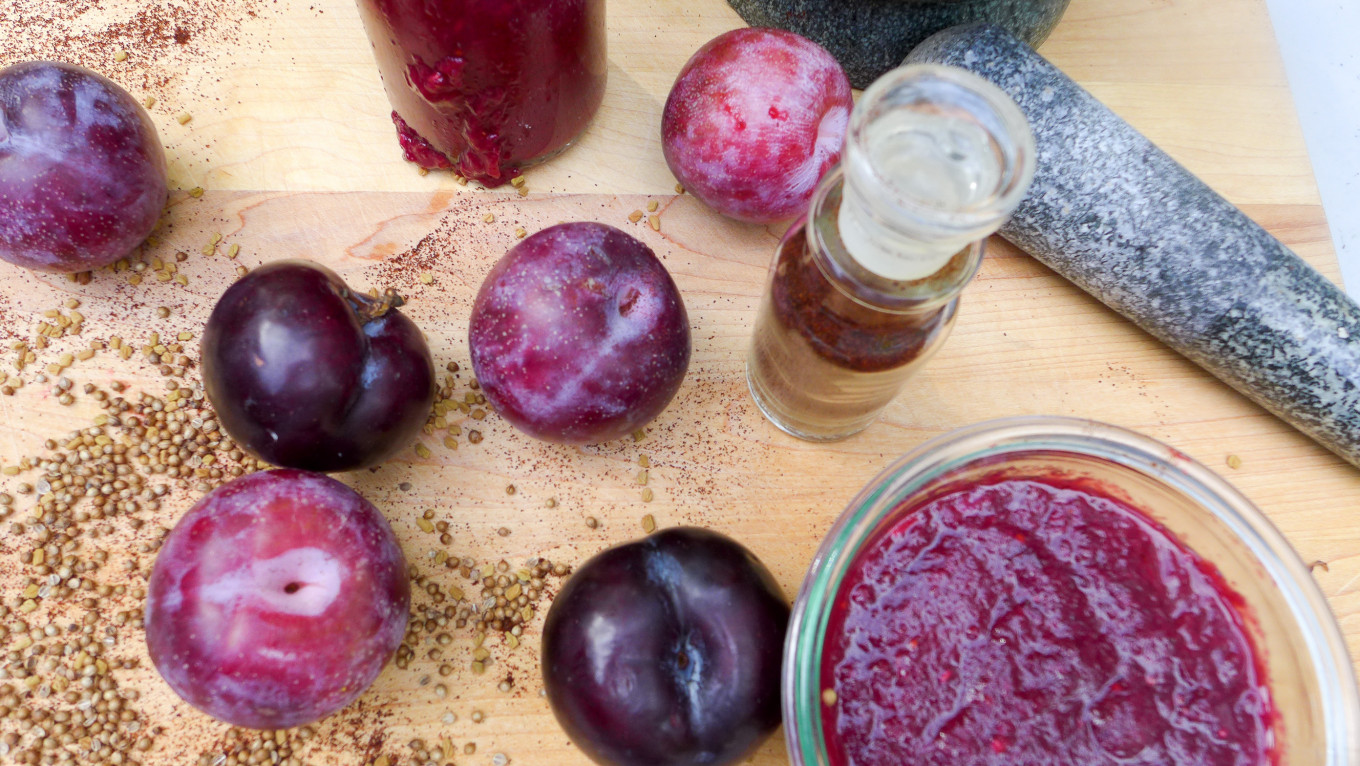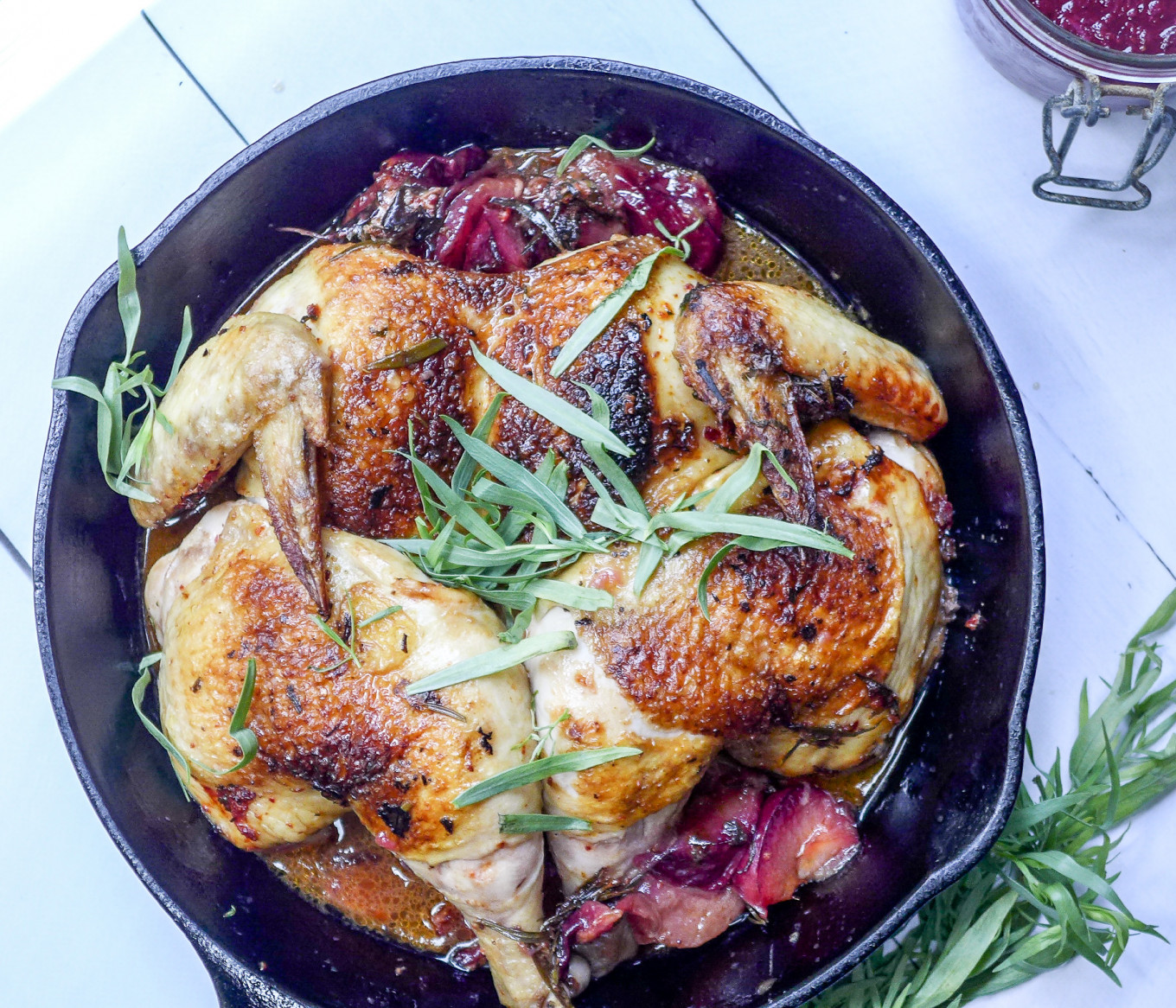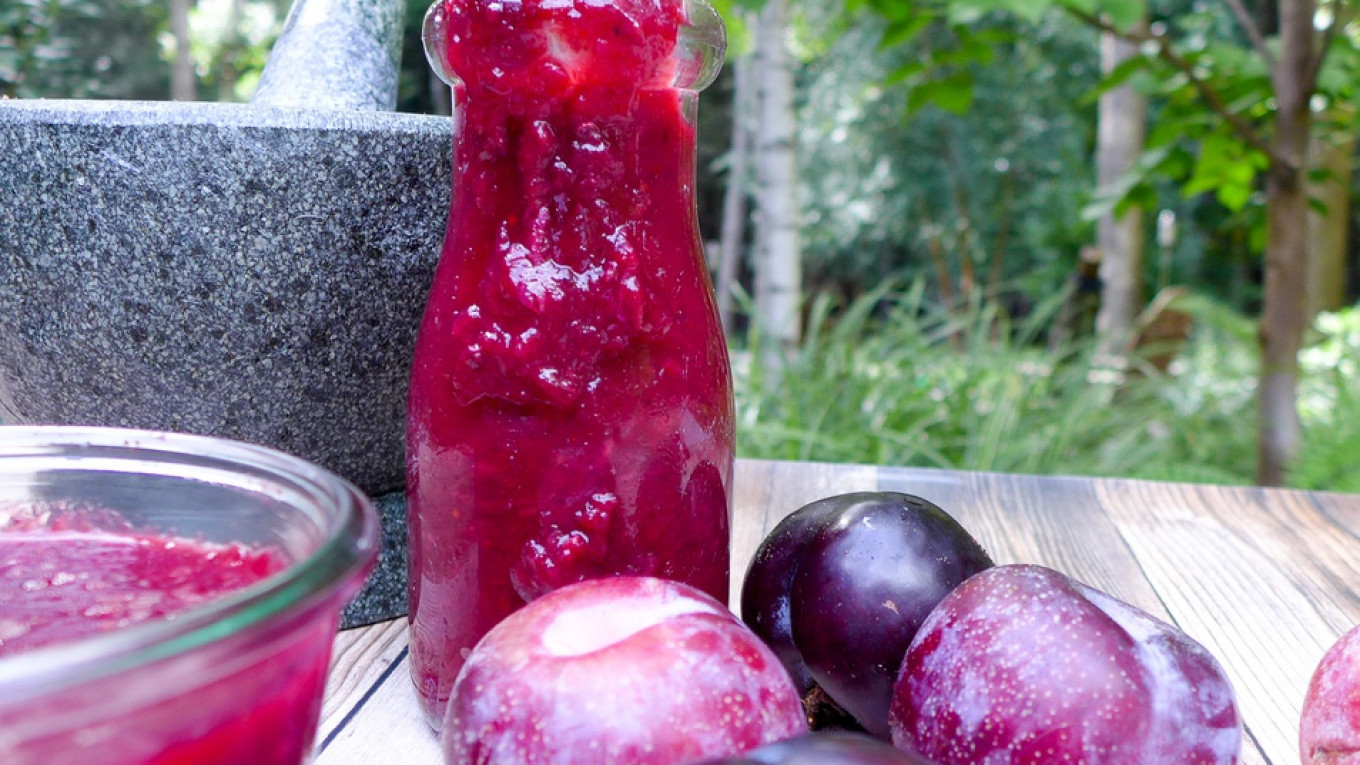There is a week in late August or early September when the predominance of peaches gives way to a magnificent parade of plums with their dusky skins and impossibly sweet yellow and red flesh.
Is it any wonder that the very word “plum” is synonymous with everything good and special? Their intense sweetness seems to have distilled all of summer’s bounty inside their smooth skins. Their appearance creates in me an irresistible itch to capture them all in a glittering row of 300-ml jars as jams, sauces, and condiments.
So as soon as the first damsons appeared in the market, I bought a bag and lugged them home. I wasn’t thinking so much of preserves as a plum cake and spatchcocked chicken with plums. Alas, neither project happened since the following day the plums had mysteriously disappeared overnight.
“Where did all the plums go?” I asked my Russian husband. He was the likely culprit: in June, he often substitutes a kilo of cherries for dinner, and in July, apricots are his primary food group.
“Plums…” he said as if trying to recall that he’d made a meal of them the previous evening. My husband is very tricky: he’ll never come out and admit he’s done something wrong, but he won’t deny an infraction either. It’s a very fine line, and he walks it adroitly.
“Oh dear,” I said, “It’s a little worrying because they were the kind with the poison stones.”
Poison, of course, has been much in the news of late, but he was too smart for me — he’s read his Tolstoy.
“That’s all right,” he rejoined promptly with a grin. “I threw the stone out the window!”
This plum reference comes from Russian writer Leo Tolstoy who was apparently between a couple of more significant projects when he penned a little fable about Vanya, the boy who steals a plum from a bowl in the kitchen. When his father asks where it might have gone, Vanya sneakily claims ignorance, knowing that he’s consumed the plum and destroyed the evidence. Both parents adopt concerned expressions, and the father says that he hopes whoever stole the plum did not eat the stone because it is deadly poisonous. Vanya promptly pipes up to reassure his parents that he’d thrown the stone out the window. All then is harmony in the family.
As it was in my family — after I went to the market for more plums. As I licked my fingers, sticky with the juices of two damson plums offered as an incentive by my golden-toothed Azeri salesman at the market, I knew I would have to act fast before my husband pulled another Tolstoyan Vanya on me.
My thoughts immediately went to Tkemali, Georgia’s favorite sour plum sauce. This delectable condiment is one of my favorite ways to spice up all manner of meat, but particularly game such as chicken, duck, and turkey. It’s streets ahead of ketchup, and as Georgian food becomes more and more popular, it’s lovely to see that it is becoming more and more available in bottled form. Nothing, however, beats fresh Tkemali made from plums just off the tree, so here is a simple recipe that comes together in less than half an hour.
That is, if you can keep the plums from disappearing…

Tkemali: Georgian Plum Sauce
This recipe will work for any kind of plum: classic European oblong or Japanese (rounder). For recipe development and testing, I used a mixture of European damsons and Japanese-style “black” and red plums.
Ingredients:
- 2 lbs plums
- 2 Tbsp Khmeli suneli*
- 8 cloves of garlic, grated
- 2 Tbsp freshly chopped mint
- 2 Tbsp freshly chopped dill
- 2 Tbsp freshly chopped cilantro leaves, stems removed
- 2 Tbsp red wine vinegar
- 1 tsp salt
- Optional: ¼ cup honey or agave nectar
Instructions:
- Wash the plums and place them in a heavy-bottomed pan with a tight lid. Add 1 cup of cold water and place over medium heat. Cook until the liquid is simmering and the plums have begun to soften (anywhere from 10-15 minutes).
- Pick the stones out of the mixture with tongs, then pass the plums through a food mill or strainer, using the back of a wooden spoon to press the flesh of the fruit through. Discard the skin.
- Return the plum flesh to the pot over medium heat, then and add the salt, garlic, vinegar, and Khmeli suneli. Stir to combine, then lower the heat until the mixture is very gently simmering. Cook covered for ten minutes. Taste and adjust seasonings. Plums vary wildly between sweet and tart, so the flavor will very much depend on the plums you use. If you find the mixture too tart, this is the time to add the honey or agave.
- Allow the mixture to cool, then add the freshly chopped herbs. Serve at room temperature as a condiment.
- Note: This recipe will keep, refrigerated, for about three weeks. If you would like to preserve this for a longer shelf life, decant the mixture into sterilized canning jars and immerse in boiling water for 8-10 minutes.
*Khmeli Suneli is a Georgian spice mix sold in markets and grocery stores across Eastern Europe consisted of fairly equal parts of ground blue fenugreek, dried marigold petals (also called calendula), coriander seed, marjoram, chili pepper, hyssop, dill, and basil). Grocery providers such as Amazon are selling it.

Lazy Chicken Tabaka with Plums
This basic recipe is a weeknight favorite, to which I add plums or tomatoes when in season. The inspiration is the Georgian classic Chicken Tabaka, but this recipe pares things down, and you don’t need a brick or a wood fire.
A spatchcocked chicken is a whole chicken from which the backbone has been removed, allowing you to open it up like a book. This is easily done with a very sharp knife or kitchen shears, or you can ask your grocery store butcher to do this. If this proves too difficult, just substitute 4 chicken legs with thighs.
Ingredients:
- One 3-4 lb (1.5-3 kg) young chicken, spatchcocked
- 3 Tbsp Aleppo pepper or sweet pepper flakes
- 1 Tbsp orange zest
- 4 garlic cloves, finely minced or grated
- 1 Tbsp salt and more for finishing
- ⅓ cup olive oil
- 2 Tbsp chopped fresh rosemary
- ¼ cup (60 ml) chopped fresh tarragon
- 2 Tbsp butter
- 6 ripe plums, quartered with the stones removed
- Garnish: more fresh tarragon or any fresh herbs
Instructions:
- Combine the Aleppo pepper, orange zest, salt, olive oil, garlic, rosemary, and tarragon together in a bowl.
- Smear the mixture over both sides of the chicken, taking care to get it into all the nooks and crannies of the bird.
- Place the chicken in a plastic bag or in a non-reactive glass container covered with plastic wrap and refrigerate for at least 4 hours, but much better overnight.
- When you are ready to cook, allow the chicken to come to room temperature (1-2 hours), then pat it dry.
- Preheat the oven to 325℉ (165℃). Adjust the rack to the middle of the oven.
- Melt the butter in an oven-proof skillet over medium heat. When the butter is sizzling, place the chicken, skin-side down into the skillet. Reduce the heat slightly and then leave it to cook for about eight minutes. You want the chicken skin the crisp up nicely and cook sufficiently so that it does not pull away. Keep an eye on it and resist the temptation to flip it too early. You can probe gently with a pair of tongs or the back of a rubber spatula to determine if it is done.
- After eight minutes when the spatula easily lifts the edge of the chicken, use a pair of tongs to flip the chicken over and let the other side cook in the accumulated juices for six minutes. Sprinkle a bit of salt on the skin side. Scatter the plums around the perimeter of the chicken
- Place the skillet with the chicken in the oven to finish cooking for 15 minutes. The plums will soften and mix with the chicken juices for a delectable sauce.
- Tent the cooked chicken with a large piece of foil for ten minutes. Carve into four pieces and spoon the accumulated pan juices over the chicken. Garnish with fresh tarragon.
Jennifer Eremeeva is a longtime expat who writes about Russian history, travel, cuisine, and culture. Follow her on Twitter @JWEremeeva.
A Message from The Moscow Times:
Dear readers,
We are facing unprecedented challenges. Russia's Prosecutor General's Office has designated The Moscow Times as an "undesirable" organization, criminalizing our work and putting our staff at risk of prosecution. This follows our earlier unjust labeling as a "foreign agent."
These actions are direct attempts to silence independent journalism in Russia. The authorities claim our work "discredits the decisions of the Russian leadership." We see things differently: we strive to provide accurate, unbiased reporting on Russia.
We, the journalists of The Moscow Times, refuse to be silenced. But to continue our work, we need your help.
Your support, no matter how small, makes a world of difference. If you can, please support us monthly starting from just $2. It's quick to set up, and every contribution makes a significant impact.
By supporting The Moscow Times, you're defending open, independent journalism in the face of repression. Thank you for standing with us.
Remind me later.







